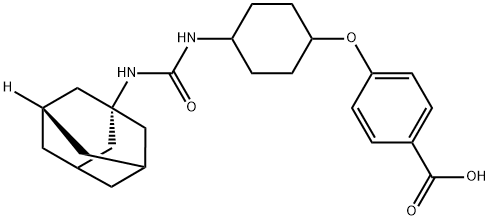trans-ACUB is a potent inhibitor of soluble epoxide hydrolase (sEH) which is known to convert epoxides to their corresponding diols. Inhibitors of sEH act as anti-inflammatory, anti-hypertensive and cardioprotective agents.
trans-aucb is a potent inhibitor of soluble epoxide hydrolase (seh).soluble epoxide hydrolase (seh) can convert epoxides to their corresponding diols. inhibitors of seh have anti-hypertensive, anti-inflammatory, neuroprotective, and cardioprotective effects.
a previous study showed that the pretreatment with dapt could substantially potentiate the growth inhibition caused by t-aucb in u251 and u87 cells. moreover, the pretreatment with dapt markedly increased t-aucb-induced apoptosis of u251 and u87 cells. moreover, t-aucb alone did not obviously affect caspase-3 activity in the cells, but t-aucb plus dapt pretreatment caused significant increase of caspase-3 activity. in addition, the pretreatment with dapt was able to completely block t-aucb-induced phosphorylation of p38 mapk, mapkapk2 and hsp27 in the cells [1].
a previous animal study was conducted to investigate the effects of acute seh inhibition by t-aucb on infarct volume, functional outcome, and changes in cerebral blood flow (cbf) in a rat model of ischemic stroke. it was found that t-aucb could significantly reduce cortical infarct volume by 35%, elevate cumulative epoxyeicosatrienoic acids-to-dihydroxyeicosatrienoic acids ratio in brain cortex by twofold, and improve functional outcome in arm-flexion test when compared with that of the vehicle-treated group [2].
[1] li jy, li rj, wang hd. γ-secretase inhibitor dapt sensitizes t-aucb-induced apoptosis of human glioblastoma cells in vitro via blocking the p38 mapk/mapkapk2/hsp27 pathway. acta pharmacol sin. 2014 jun;35(6):825-31.
[2] shaik js, ahmad m, li w, rose me, foley lm, hitchens tk, graham sh, hwang sh, hammock bd, poloyac sm. soluble epoxide hydrolase inhibitor trans-4-[4-(3-adamantan-1-yl-ureido)-cyclohexyloxy]-benzoic acid is neuroprotective in rat model of ischemic stroke. am j physiol heart circ physiol. 2013 dec 1;305(11):h1605-13.
